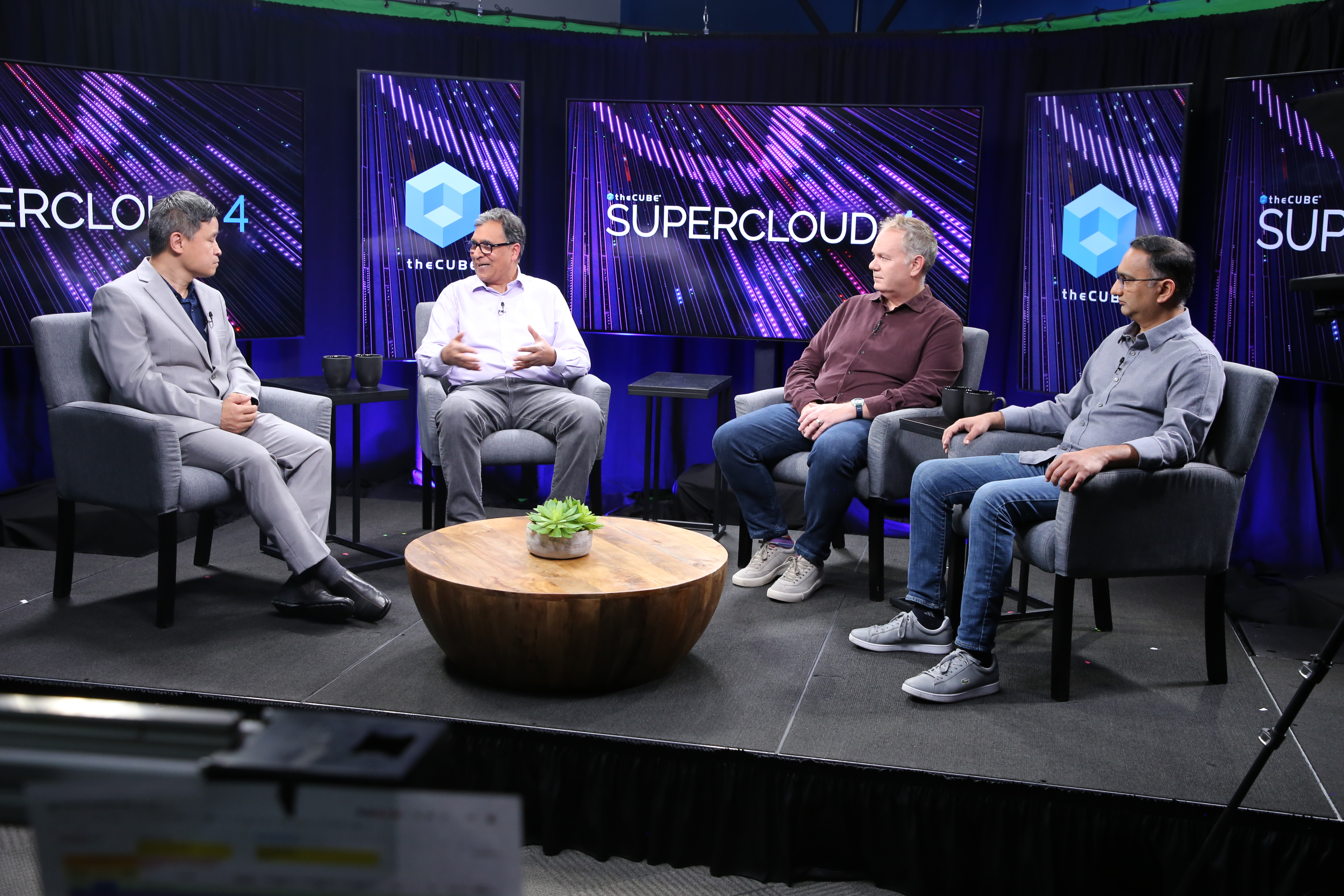 CLOUD
CLOUD
 CLOUD
CLOUD
 CLOUD
CLOUD
Amid the hype surrounding generative AI is one inescapable reality: Model training is moving much faster than ever before.
Generative AI has put a turbo charge into the pace of model development while reducing the amount of data needed, an important trend in the future of the technology for the enterprise. This has not escaped the notice of experts in major AI players, such as Google LLC.
“Look at where we were and where we are,” said Warren Barkley (pictured, second from right), cloud AI leader at Google. “If you want to go train this model to understand this type of PDF, a tax PDF or something like that … to do that you would have to have tens of thousands of examples to train that model. To be able to do that today, to do entity extraction or something like that, it takes a few hundred. We’re at a very different place than we were a year or two ago.”
Barkley spoke with Howie Xu (far left), panel moderator and senior vice president of engineering AI/ML at Palo Alto Networks Inc., at Supercloud 4, during an exclusive broadcast on theCUBE, SiliconANGLE Media’s livestreaming studio. He was joined by Jayesh Govindarajan (far right), SVP of Salesforce AI at Salesforce Inc., and Vijay Mital (second from left), corporate VP of AI architecture and strategy at Microsoft Corp., and they discussed key developments in enterprise adoption of AI across multiple industries.
The recent progress in the power of AI model development cited by Barkley has placed additional focus on key tools that enterprises are beginning to rely on in increasing numbers for generative AI solutions. One of these is Microsoft Copilot, a generative AI-powered assistant capable of automating a variety of tasks.
In September, the company expanded Copilot throughout Windows 11 and Microsoft 365, along with its web browser Edge and Bing. Microsoft’s Mital was asked whether users could expect to see additional announcements about Copilot soon.
“Things that are possible will get delivered,” Mital said. “I will not speculate on the time scales. You have seen the tip of the iceberg, and you will see more.”
Enterprises are diving into the AI pool, despite uncertainty in many cases about what should happen after that. Companies are in the experimental stage, a reality that Salesforce’s Govindarajan acknowledges.
“We are at a point now where the CEO has played around with ChatGPT and loved it,” he said. “The first thing they did is went and got a license for their company, they put a few engineers on it. They produce some prototypes, and they don’t quite know where to go next. How do you craft them into products? That is a huge solution gap that’s going to be filled pretty quickly.”
A part of the answer may rely on grounding, a process for linking abstract knowledge in AI systems to real-world examples. In August, Google announced the launch of a grounding service for Vertex AI foundation models, and there have been reports that it is testing a similar service for Google search.
“You have grounding, which is important as well,” Barkley said. “Models are relatively elastic, and they do a pretty good job of many things. But it ends up being how specialized you need to be.”
Along with the challenges of implementing AI models that will generate meaningful results for a business, the Supercloud 4 panelists expressed a firm belief that AI will have enormous positive impact over time. This includes an opportunity to transform jobs beyond those of just knowledge workers.
“The biggest opportunity that I see is uplifting physical work,” Mital said. “Feed information to me … allow me to get the job done.”
Education represents another prime area of opportunity where AI can make a significant difference, according to Govindarajan.
“Everyone will have a personal tutor,” Govindarajan said. “Imagine a tutor that could teach you just in time how to run a marketing campaign as a startup. Personalizing education to uplift, to learn, I think is going to be the biggest killer app.”
The panel’s optimistic view is likely based in part on rapid adoption of generative AI across industries. A recently released study by McKinsey & Co. reported that a majority of respondents had already adopted AI in their organizations, a factor that is being influenced by the rapid innovation currently surrounding the AI world.
“Every week we see new innovation, and that’s the exciting part of it,” Barkley said. “There are areas that can definitely be accelerated. It takes time. People who are putting these things into production today, they’re reaping benefits right now.”
Here’s the complete video interview, part of SiliconANGLE’s and theCUBE’s coverage of Supercloud 4:
Support our mission to keep content open and free by engaging with theCUBE community. Join theCUBE’s Alumni Trust Network, where technology leaders connect, share intelligence and create opportunities.
Founded by tech visionaries John Furrier and Dave Vellante, SiliconANGLE Media has built a dynamic ecosystem of industry-leading digital media brands that reach 15+ million elite tech professionals. Our new proprietary theCUBE AI Video Cloud is breaking ground in audience interaction, leveraging theCUBEai.com neural network to help technology companies make data-driven decisions and stay at the forefront of industry conversations.